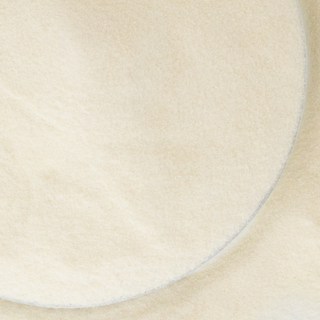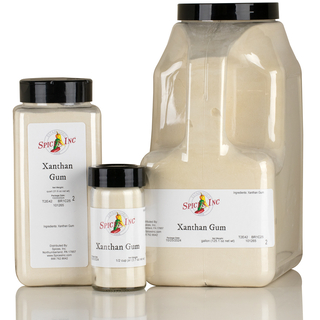Xanthan Gum




Xanthan Gum
Xanthan Gum is an odorless, flavorless thickening and stabilizing agent. It is also known as xanthan gum powder or corn sugar gum.
Xanthan Gum is a polysaccharide, or a carbohydrate chain that swells upon contact with water to create a gummy, elastic food additive. It’s derived from the fermentation of sucrose, lactose, and glucose. It is a gluten free product.
Xanthan Gum is frequently used by:
- manufacturers of dressings, sauces, spices, gravy, dairy products, and beverages; and
- gluten-free bakers
Flavor Profile
Xanthan Gum is flavorless and odorless, and develops a sticky texture when it is in contact with water.
How To Use
Xanthan Gum is often used to stabilize food products that might separate in the packaging, like salad dressings. It can also be used as a thickener for products like yogurt or ice cream. Bakers will often use Xanthan Gum as a means to provide stability, structure, and elasticity to their gluten-free goods, since it is an effective replacement for gluten.
Use Xanthan Gum sparingly. While it can add elasticity, too much Xanthan Gum will create products that have an unpleasant, gummy texture. Baked goods tend to not bake thoroughly. A good proportion to start with is 1/4 teaspoon of Xanthan Gum per cup of product; adjust up or down as necessary.
| Also Called | Xanthan gum powder or corn sugar gum |
| Ingredients | xanthan gum |
| Flavor Profile | Flavorless and odorless |
| Recommended Uses | Breads, dressings, ice cream, stew, soup, ice cream, beverages |
| Cuisine | Global |
| How To Store | Airtight container in a cool, dark place |
| Shelf Life | 1-2 years |
| Country of Origin | USA |
Nutrition Facts
Serving Size1 tsp
Amount Per Serving
Calories20
% Daily Value*
Total Fat0g0%
Saturated Fat 0g0%
TransFat 0g
Polyunsaturated Fat 0g
Monounsaturated Fat 0g
Cholesterol0mg0%
Sodium100mg4%
Total Carbohydrate4.0g1%
Dietary Fiber 0.0g0%
Total Sugars 0.0g
Added Sugars 0g0%
Sugar Alcohol 0.0g
Protein0.0g0%
Vitamin D0mcg0%
Calcium0mg0%
Iron0mg0%
Potassium0mg0%
*The % Daily Value (DV) tells you how much a nutrient in a serving of food contributes to a daily diet. 2,000 calories a day is used for general nutrition advice. These values were calculated and therefore are approximate. For more accuracy, testing is advised.
